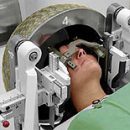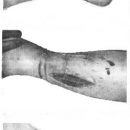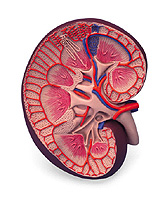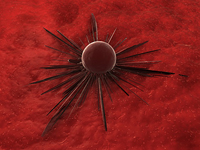Currently, among all kidney tumors, the order of 90-95 percent is to renal cellular cancer, which is also often called adenocarcinoma kidney, hypernefroma, tumor with light cells. Considering the predominance of renal and cellular cancer in the structure of the kidney tumors, then it will be part of him.
Content
Why occurs kidney cancer?
Say why kidney cancer occurs difficult, to say why
kidney cancer occurs in a particular patient, it is impossible. Exist
Data that people employed in the production of aniline dyes
kidney cancer met much more often. In this regard, some
Carcinogens formed in the production of aniline dyes,
accused of carcinogenic effect on the kidney. The same carcinogens
accused of involvement in the occurrence of bladder cancer.
Increased risk of disease is noted in patients with illness
Hippel Lindau, horseshoe kidneys, polycystic and acquired
cysts that are accompanied by increased blood content
Azotist substances (Uremia). Last state is the result
Insufficient kidney function.
Symptoms of kidney cancer
There are three symptoms of kidney cancer, about which usually
Patients turn to the doctor - hematuria, abdominal education and pain.
Hematuria is literally translated from the Latin language as «Blood in the urine».
Distinguish microhematuria and macrohematuria. With microhematuria elements
blood in the urine can only be seen under the microscope. Naturally
This study is performed in the laboratory. Watering remains
ordinary color. With macrohematuria urine acquires red
Due to blood. Tom
It is possible to notice this without a microscope. Most often, hematuria appears on
the background of complete health, while, which is characteristic of kidney cancer, more often
Total hematuria is not accompanied by pain (this is more
Characteristic for renal colic with urolithiasis). After yours
The appearance of hematuria can quickly disappear. It is repeated
Maybe completely through various dates - in a few days, months,
and sometimes in a year or two. Bleeding occurs due to growth
tumor that destroys fabric
kidney rich in blood vessels. Of them and blood flows. Blood
can roll in clots, which in turn can cause
Renal colic, similar to the one that occurs when urolithiasis.
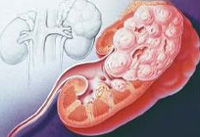
The tumor gradually increases in size, which leads to
The emergence of the second symptom - the appearance of some neoplasm in the abdomen.
Kidney along with a tumor can be palpable through belly. Often
Slept patients notice their own kidney in the early stages. More often
the whole fact of the detection of the kidney during the inspection of the abdomen does not speak of early
Stages of tumor.
In the absence of treatment, the tumor goes beyond the kidney capsule and
germinates in neighboring structures - fatty tissue, blood
vessels. As a result of the compression of the nerve endings, pain may appear.
Only 10-15 percent of cases pain appears in early cancer forms
kidney. In most cases, pain speaks about a common tumor.
The tumor germinates nearby vessels, as a result of which it may be broken
Current of venous blood according to the trunk venous vessel of the abdominal cavity -
Bottom Hollow Vienna. In men
Such a violation can lead to varicocele - expansion
veins of seed cord.
Pain may be due to tumor metastasis - appearance
new foci of growth in other organs. Kidney cancer metastasis practically
In all organs and fabrics. Most often metastases are found in the lungs,
liver, bones.
Sometimes kidney cancer can manifest as unusual symptoms. So
Tumor can produce hormones or biologically active substances.
As a result, a significant increase in quantity can develop
Erythrocytes in the blood, a significant increase in blood calcium level,
Enhance arterial pressure, violation of the liver function, etc.
Diagnostics of kidney cancer
The diagnosis is based, of course, on the complaints of the patient, as well as
on data inspection and generalization research methods (clinical
Blood test, clinical analysis of urine and others.). Currently
The main methods of tool diagnosis of kidney cancer is
Ultrasound examination of the abdominal organs, urography
(X-ray study of the kidneys with the help of contrasting substances),
Radionuclide scanning, as well as computed tomography and
Magnetic resonance imaging. The last two methods
allow to accurately determine the prevalence of the tumor.
Mandatory in a patient examination with suspicion of kidney cancer
is x-ray light, as well as radiography of bones pelvis and
Chest. With suspected metastatic bone damage
It is necessary to carry out radionuclide bone scans, which
Allows you to clarify the presence of metastases in the bones.
Treatment of kidney cancer
The main method of treatment of kidney cancer is surgical.
Operational intervention in almost all cases when it
Maybe. During the operation, kidney removal is removed as well
fatty fiber that surrounds it and ureter (radical
Nephrectomy). Currently, organ-brewing
kidney cancer operations. They are held at the early stages of the tumor in
cases when the patient is impossible to remove the kidney. In this case, it's not coming
about the prevalence of the process. We are talking about those cases,
When the remaining kidney can not take on all functions on the allocation
Metabolism products from the body. Such operations suggest
Removal only part of the kidney. As scientific research shows,
Remote results of such operations differ little from operations on
Removal of the kidney (nephrectomy). However, after conducting organ-brewing
Operations There are a higher risk of local recurrence.
Five-year survival in patients after radical nephrectomy
The first stage is 70-80 percent. If the tumor is striking the bottom
Pole Vienna, then after surgery 5 and more years live 40-50 percent
Patients (2 Stages). When involving the renal vein (2 stage)
Five-year survival rate is 50-60 percent. If the process was
Involve tillage, surrounding kidney (3 stage), survival
It is 70-80 percent. With the defeat of regional lymph nodes (3-4
Stage) 5-year survival
ranges from 5 to 20 percent. In the presence of tumor germination in
Neighboring organs or remote metastases 5 year survival
represents no more than 5 percent.
Currently, most scientists recognize appropriate
Conducting operation for single remote kidney cancer metastases. How
show research results, such operations improve quality
life of the patient and prolong his life.

